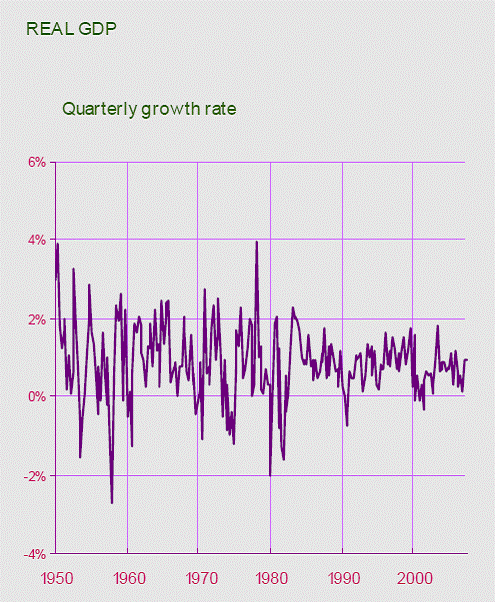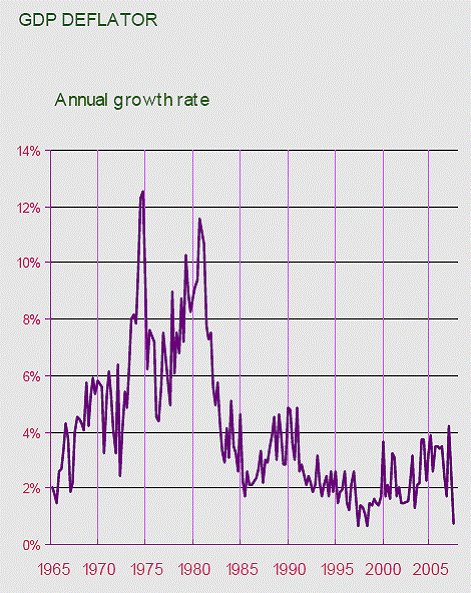Another interesting paper presented at the Society for Nonlinear Dynamics and Econometrics Symposium that I attended last week was by
Anton Nakov of the Bank of Spain and Andrea Pescatori of the Federal Reserve Bank of Cleveland on the role that changes in energy markets may have played in the reduction in GDP and inflation volatility observed since 1984.
 |
One of the features that has to strike you if you look at a plot of U.S. real GDP growth rates over the last half century is the fact that its volatility (the magnitude of deviations above or below the average growth rate) has dampened considerably since the mid 1980s. No less striking is the apparent reduction in the level and volatility of inflation.
 |
One sometimes can get the impression from discussions in the popular press
that an investigation into what’s behind these changes is somehow ideological or agenda driven. But to most economists studying this matter, it is simply an objective feature of the data for which an explanation should be sought. Margaret McConnell and Gabriel Perez-Quiros were the first to document that the reduction in GDP volatility is a statistically significant development. Since their study, there have been a number of academic papers documenting this phenomenon and investigating the possible factors behind it.
I found the latest study by Nakov and Pescatori particularly interesting, in that it looked among other things at the role that changes in oil markets may have played in these trends. We saw three major disturbances in global oil supplies in the 1970s and early 1980s, associated with the 1973-74 oil embargo by the Organization of Arab Petroleum Exporting Countries, the 1978 Iranian revolution, and the subsequent war between Iran and Iraq, which
many economists believe
contributed to the recessions that followed each of these events. Since 1984, however, we have been more fortunate in only seeing one such big disturbance (the one associated with the 1990-91 Persian Gulf War). Moreover, many economists argue that the decreasing dollar share of energy expenditures in total value added may have made the economy
less vulnerable to effects of oil supply disruptions.
One of the interesting features of Nakov and Pescatori’s new paper is that they try to distinguish between supply and demand factors
in influencing the determinants of oil prices. They use a model in which part of the world oil market is controlled by an OPEC monopoly while the rest of the market is competitive. According to such a view, one transmission mechanism whereby oil supply disruptions may influence the economy is through inducing variations in the economic distortions induced by monopolizing markups. I am
not persuaded
that this is the best way to interpret global oil markets, but I found the effort thoughtful and well done.
The authors then infer estimates of the magnitudes of pre- and post-1984 disruptions in oil supplies on the basis of the the observed variability in relative oil prices, and calibrate the reduced share of oil in total expenditures directly from the observed magnitudes. Their effort also examines a number of the other main competing explanations for the moderation in output and inflation. Most prominent among these are first the idea that monetary policy has become both more predictable and more aggressive in responding to deviations of inflation or output from the intended targets, and second the “good luck” hypothesis– the economy has simply been subject to less year-to-year variation in productivity growth, for unknown reasons.
| Oil share | Oil shocks | Monetary policy | Productivity | Other | Total | |
|---|---|---|---|---|---|---|
| Inflation | 34.6 | 9.1 | 60.4 | 9.7 | -13.8 | 100.0 |
| GDP | 13.4 | 7.0 | 4.7 | 71.9 | 3.0 | 100.0 |
Nakov and Pescatori’s simulation predicts that a combination of the above factors could account for a 52% reduction in the volatility of GDP growth and a 58% reduction in the volatility of inflation since 1984, both of which are quite close to what is actually observed. The table above shows how big a contribution the various factors they studied would be predicted to make to these totals. They conclude that although improved monetary policy is the biggest single factor in the reduced volatility in inflation since 1984, changing oil markets have also helped, with the reduced reliance on oil accounting for 1/3 of the reduction and the reduced prevalence of major oil supply shocks accounting for an additional 9% of the reduction in the volatility of inflation.
By contrast, the authors conclude that neither monetary policy nor oil markets are the main explanation for the reduced volatility of GDP. According to their calculations, the reduced reliance on oil and increased stability in oil markets might account for about 1/5 of the reduction in GDP volatility, while monetary policy mattered very little. Instead, the biggest factor seems to be unexplained changes in productivity– the reduced volatility of real GDP may be largely a matter of having had some better luck.
Although it may be a little frustrating intellectually to conclude that “good luck” is the main explanation for the reduced volatility of GDP, that’s the same conclusion reached in many of the previous investigations of this question, such as those by James Stock and Mark Watson and Sylvain Leduc and Keith Sill.
Technorati Tags: macroeconomics,
oil shocks,
economics,
great moderation
This looks very interesting.
The big problem I have with the thesis that improved monetary policy played a major role in the great moderation is that I have yet to see a good econometric paper like this demonstrating the improved monetary policy thesis.
Have I missed it?
Spencer, one of the most influential papers propounding the monetary policy thesis was Clarida, Gali, and Gertler, QJE, 2000.
I find it interesting that the conclusion for this phenomenon might be “dumb luck”. I have thought about this a great deal in regards to a lot that happens to us as individuals and as a nation. I know there have been studies about why the developed world ended being, well, the developed world. I believe a large part of the conclusion was . . . luck. (That doesn’t negate the hard work done by a lot of people simply that you have to be somewhere where the hard work matters, I guess). In any event, the phrase “born on third base and thought he hit a triple” (so aptly describing the Current Occupant of the White House) might really apply to the whole country. Once based on the hard work and capital development of our parents and grandparents, perhaps our country now is essentially living on nothing more than past good fortune. Doesn’t luck usually run out?
While my view may be slightly biased (as I work in IT) it was around the mid-80’s when the PC started to rear its digital head. It would be interesting to somehow quantify the change in information flow from the early 80’s on, when investment firms started to latch onto sites such as Bloomberg’s output of on-the-spot financial data.
The increasing speed and abundance of information should have made it more difficult to rig the system. Once somebody starts to make a “killing”, then either everybody else tries to jump on the same boat or changes to the underlying economics were made to remove the profit. Conversely, problem areas could be “nipped in the bud”, so that losses would not be as big due to the exchange of information over the internet.
You also had the rise of money traders with the internet, where a country’s wealth is determined in large part by nearly instant changes to exchange rates, all done electronically over a pair of wires. Anybody in the world with sufficient credit can play, if you can handle the high-risk stakes.
I would speculate that the reduction in volatility is due to the introduction of much more transparent (computerized) supply chain management (just-in-time delivery), which has eliminated the inventory cycle as a cause of GDP fluctuations. No-one has much extra inventory, so they don’t need to shed it whenever they get a little worried about conditions. This paper seems relevant.
I’m on board with computerization offering better, more widely distributed information. A lot of the drivers for business cycles stems from uncertainty and how individuals strive to protect themselves.
What has not been mentioned is the mathmatics of regression to the mean. The US economy has grown substantially over this time frame. The global economy has become much more interlinked making the global system work more as a whole. Combine these two factors and the whole economic system is much larger. That would suggest that variations will be smaller, just on a random basis.
Maybe it not “good luck” but rather less influence of bad or random luck within a larger, more resilient economic system.
Stuart and Joseph, there are a number of economists who have also proposed that improvements in inventory managment due to superior information technology have played a role– see for example Kahn, McConnell, and Perez-Quiros (2002)— though the state-level evidence paints a different picture (Owyang, Piger, and Wall, 2007).
I thought a large part of the reduced volatility in GDP came from the increased share of services in the economy and the consequent reduction in the importance of the Keynesian multiplier-accelerator business cycles. Was this mistaken?
Finally an economic model I can believe in – luck.
I am always amused to see a GDP prediction for 6 month into the future at the same time GDP 2 qtrs ago is revised. They can’t tell you what just happened (without revising it a few times) but they try to tell you what is going to happen. At least weathermen can tell you if it rained yesterday (without revising it a few times).
JDH—you got it! I really don’t understand why we need a more complex explanation: service businesses don’t have inventory and tend not to borrow money, therefore the business cycle is muted.
The fact that energy is a smaller part of the economy is another way of saying that services have a bigger piece of the pie.
Dan Ogden
Suppose one started to include the GDP growth rate variability of non-US, especially emerging countries newly participating in global markets.
You’ll find your GDP volatility (and higher mean too) right there.
The high productivity growth, high fluctuation capital-intensive industry has moved out of US.